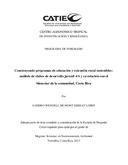| dc.description.abstract | En América Latina, esta investigación es una contribución pionera al análisis de los impactos del programa 4-S sobre el desarrollo positivo juvenil y su relación con el bienestar de la comunidad en Costa Rica. Se combinó el Marco de las 5C’s del Desarrollo Positivo Juvenil con el Marco de los Capitales de la Comunidad con el objetivo ampliar el enfoque del análisis del nivel personal/ fami-liar hacia el nivel comunitario. Los resultados nos llevan a concluir que el programa 4-S brinda oportunidades de aprendizaje colectivo y constructivo en el proceso de formación y creación de capacidades de liderazgo en el país, contribuyendo al fortale-cimiento de los capitales humano, social, cultural y político de las comunidades. Por consiguiente, basado en los resultados de este estudio se elaboró una propuesta de diseño y gestión de clubes 4-S sostenibles, con enfoque orientado al desempeño y resultados, o sea, “no mirar hacia las ramas y frutos, más bien hacia las raíces y tronco†. Con la metodología de planificación Balanced Score-card es posible relacionar personas, sistemas y procedimientos principalmente para reducir costos y aumentar la proyección de los resultados institucionales del Consejo Nacional de Clubes 4-S de Costa Rica y perpetuar así estos resultados exitosos de 64 años de historia. This study represents a pioneer contribution in Latin America to the analysis of 4-S prograMON and its impact on youth development and community wellbeing in Costa Rica. The combination of the 5C’s of Positive Youth Development Framework with the Community Capitals Framework allows the expansion of the personal/family level to the community level. The results lead us to conclude that the 4-S program provides oppor-tunities for collective learning and builds leadership capacity in the country, contributing to the strengthening of human, social, cultural and political capitals in communities. Therefore, based on these results, this study presents a proposal for the design and management of sustainable 4-S clubs, with an approach oriented towards the measurement of performance and results, “do not look into the branches and fruits, rather to the roots and trunk.†The Balanced Scorecard planning methodol-ogy can connect people, systeMON and procedures primarily to reduce costs and increase the projec-tion of institutional results of the National 4-S Clubs of Costa Rica, thus perpetuating the successful results of 64 years of history. | es_ES |


